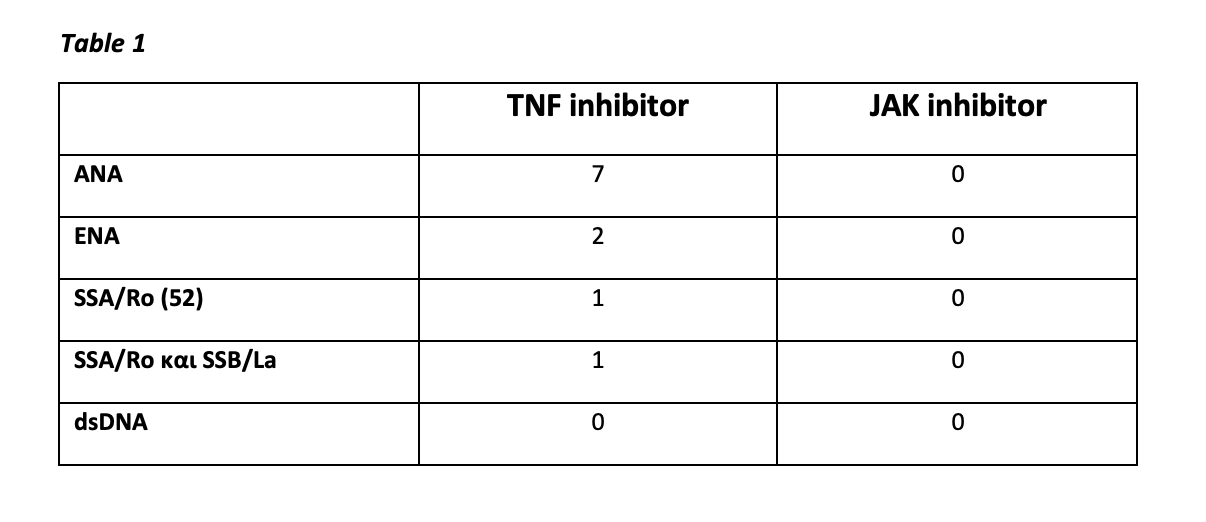Session Information
Date: Tuesday, October 28, 2025
Title: (2227–2264) Rheumatoid Arthritis – Diagnosis, Manifestations, and Outcomes Poster III
Session Type: Poster Session C
Session Time: 10:30AM-12:30PM
Background/Purpose: Rheumatoid arthritis (RA) can coexist with other autoimmune disorders such as Sjögren’s syndrome and systemic lupus erythematosus (SLE). In these cases, the terms secondary Sjögren’s syndrome or Sjögren’s syndrome overlap and lupus-like syndrome or Rupus are applied. All available biological treatments aim to suppress the autoimmune responses locally as well as systematically. On the other hand, they may interfere with the immune system by inducing autoantibodies such as the ANAs by the use of the anti-TNF inhibitors. To compare the risk of autoantibody-induction in RA patients under treatment with anti-TNFs and JAK inhibitors, as well as to evaluate their importance at a clinical level.
Methods: 83 patients with a new diagnosis of RA and were about to be treated with a biological agent were divided in 2 groups and were followed for 2 years. Patients’ age was 40-50 years. 42 patients with seropositive RA and without the presence of other autoantibodies (Group 1) and 42 with/without RA seropositivity but with ANA/ENA positivity (Group 2). 21 of both groups received an anti-TNF inhibitor and 21 received a JAK inhibitor.
Results: In group 1, no patient under treatment with JAK inhibitors showed any new autoantibodies. In contrast to those receiving anti-TNF, 7 showed ANA+ in a titer >1/80 and 2 of them ENA+ (1 with Ro52 and the other Ro52 and La). In group 2, the autoantibodies remained unchanged in all patients under JAK inhibitors and none of them manifested symptoms of the overlap syndrome. In contrast, in the anti-TNF treated patients, 8 experienced symptoms of secondary Sjögren’s syndrome (6 only sicca syndrome and 2 lung disease) and one patient manifested a lupus-like syndrome (rash, weakness and serositis).
Conclusion: This is the first study to show the different effects on autoantibodies in a series of patients with RA and other connective tissue disease under biological and targeted-synthetic therapy. The effect of non-anti-TNF bDMARDs on autoantibodies (ANA, ENA) is clearly smaller, which reflects possibly the different mechanism of action leading to a less possible autoimmune derangement. Further studies are needed to confirm these findings.
To cite this abstract in AMA style:
KALTSONOUDIS E, Kougkas N, Karagianni P, Memi T, Koletsos N, Pelechas E. Treatment-induced autoantibodies in Rheumatoid Arthritis patients receiving anti-TNF inhibitors or JAK inhibitors [abstract]. Arthritis Rheumatol. 2025; 77 (suppl 9). https://acrabstracts.org/abstract/treatment-induced-autoantibodies-in-rheumatoid-arthritis-patients-receiving-anti-tnf-inhibitors-or-jak-inhibitors/. Accessed .« Back to ACR Convergence 2025
ACR Meeting Abstracts - https://acrabstracts.org/abstract/treatment-induced-autoantibodies-in-rheumatoid-arthritis-patients-receiving-anti-tnf-inhibitors-or-jak-inhibitors/

